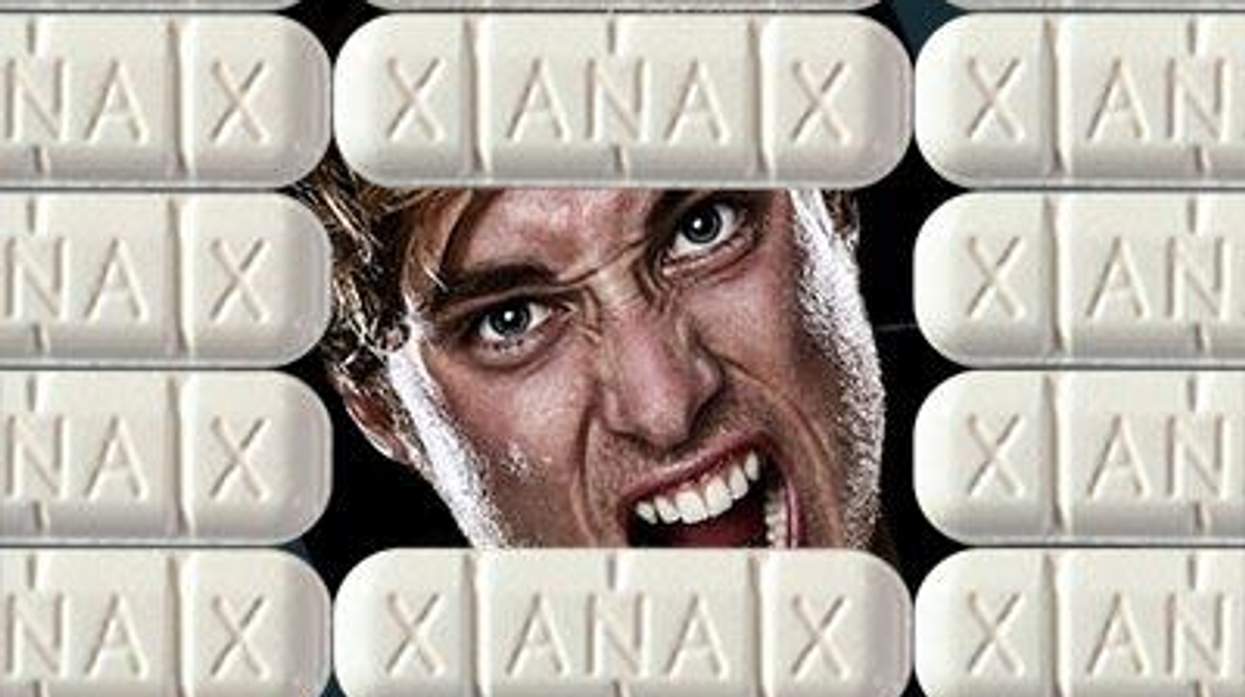I recently read The Advocate's article about Jesse Jacobs, a young gay man in Texas who was denied his dose of Xanax and presumably died as a result of the jail staff's negligence in stopping the medication. As a gay cis woman who has lost 34 months of my life to a benzodiazepine, I want the world to know that Jesse Jacobs is not the first and will not be the last LGBTQ person to die or suffer due to institutional negligence and rapid cessation of a prescribed medication.
My name is Ally. I suffer from post-acute withdrawal syndrome, a syndrome that can result if a patient discontinues a benzodiazepine too quickly. When reading the word withdrawal, the first thing that might come to mind is addiction. However, I was never a benzodiazepine addict. I took my dose each day, as directed. But the direction stopped there. I was never informed that if I stopped taking a prescribed medication too rapidly the consequence could be death or potentially, PAWS, a torturous and chronic state of gamma-aminobutyric acid underactivity resulting in hyperexcitabilty of the nervous system. Even now, as I sit in the grip of PAWS, suffering from an exhaustive list of debilitating symptoms (including but not limited to: hallucinations, body tremors, derealization, intrusive thoughts, nerve pain, nausea, headaches, and tinnitus), I still can't comprehend how this could be true. And yet each day I'm forced to recognize that it is true for me, was true for Jesse Jacobs, and is also true for many others.
I know because I encounter them every day when I visit my support groups. When I first experienced the effects of rapid cessation, I found there was little recognition to be gained from psychiatry. Once patients experience the adverse effects of these drugs, there is no legal recourse, medical liability, or national platform to speak on our behalf. Many former patients like me, searching for answers, exhaust all means of medical intervention available, often to no end. With a lack of recognition and no real medical response to be gained, most find a home in online support groups. There I met peers who understood my experience and offered community when the symptoms made every other means inaccessible; it is difficult to march in Pride parades when you can't walk or bear the uproar of an air conditioner, let alone the clamor of a crowd. As I continued to take refuge in these safe spaces, I discovered many of us had a lot more in common than we realized. Many were lesbian and gay. Many were activists. Many had experienced poverty.
Initially, this surprised me and made me feel more connected. But in light of recent deaths that have made headlines (Jesse Jacobs, Sean Levert, etc.) our likeness is less comforting. A quick glimpse into the history of psychiatry's interaction with minorities makes the narratives we share less shocking. We must not forget that psychiatry has historically pathologized citizens who deviate from the cultural norm. While it may not actively continue this practice to the same degree today, the ghost of the past lingers on in psychiatry's continued failure to recognize the humanity in emotional responses to extraordinary adversity -- evident in its swift diagnoses of those of us who face it. Different forms of institutional oppression ensure that some of us won't have access to mental health care, but when we do, the discrimination, poverty, and elevated levels of hatred that we often encounter increase the likelihood that we will be diagnosed with a variety of mood disorders. These disorders are then treated with psychoactive drugs, often as the first and cheapest mode of treatment.
At face value, that's not necessarily bad for everyone. There are some of us who, as I once did, find comfort in a name for their struggle and a proposed solution. But given the statistics on poverty, homelessness, and the increased rates of incarceration within minority communities, all of which form barriers to holistic and consistent health care, our increased probability of diagnosis becomes insidious. Within the LGBTQ community, there are many of us who could be unable to afford an alternative like cognitive behavioral therapy as a first response to mental health issues. There are perhaps even more of us who may not be able to consistently afford prescriptions or insurance coverage, resulting in dangerous lapses of medication. And there are a number of us who, like Jesse, could end up incarcerated -- our medication stopped abruptly, resulting in death or PAWS. It is important then, that the LGBTQ community, and our political communities as a whole, recognize that this is a community issue and that there are things we can do about it.
First, I am an advocate for questioning the efficacy of a drug that can cause death, long-term illness, or a constant cycle of hitting tolerance and updosing. We need to ask if this is a viable or welcomed form of affordable mental health care. We need to make sure that everyone understands the risks of these drugs, how to taper from them, and what to do if there is a lapse in care. Every psychiatric patient has the right to informed consent. It is important that when we're advocating for equality in mental health care, we're advocating for a system in which potentially dangerous prescription drugs are not the first or cheapest mode of treatment.
Secondly, we need to hold all institutions accountable for the safety of these drugs. What happened to Jesse Jacobs happened in a correctional institution, but it happens in medical settings daily.
Thirdly, we need to continue to build a community that offers safe spaces to those who have particularly unusual and trying experiences, whether it be racism, transphobia, homophobia, or iatrogenesis (illness from medical intervention or care). The conclusions I've drawn about benzodiazepines and their discontinuation stem from lived experience. We need to build a community that honors the struggle of survivors of psychiatric harm when talking about the benefits of specific drugs, one where survivor stories weigh heavily in our conversations. We need a community that respects and cares about the human experience of every individual. We need to demand that our institutions, in this case psychiatry and our penal system, do the same.
For more information on benzodiazepines and withdrawal please see the following resources:
https://www.benzo.org.uk
https://www.recovery-road.org
https://cepuk.org/
 ALLY NUGENT is a dedicated activist who works to spread awareness about psychiatric withdrawal and protracted withdrawal syndrome on various social media platforms. She draws from her own experience suffering from a rapid tapering off of a benzodiazepine and from the lessons of much wiser survivors on the issue.
ALLY NUGENT is a dedicated activist who works to spread awareness about psychiatric withdrawal and protracted withdrawal syndrome on various social media platforms. She draws from her own experience suffering from a rapid tapering off of a benzodiazepine and from the lessons of much wiser survivors on the issue.


 ALLY NUGENT is a dedicated activist who works to spread awareness about psychiatric withdrawal and protracted withdrawal syndrome on various social media platforms. She draws from her own experience suffering from a rapid tapering off of a benzodiazepine and from the lessons of much wiser survivors on the issue.
ALLY NUGENT is a dedicated activist who works to spread awareness about psychiatric withdrawal and protracted withdrawal syndrome on various social media platforms. She draws from her own experience suffering from a rapid tapering off of a benzodiazepine and from the lessons of much wiser survivors on the issue. 

































































Charlie Kirk DID say stoning gay people was the 'perfect law' — and these other heinous quotes